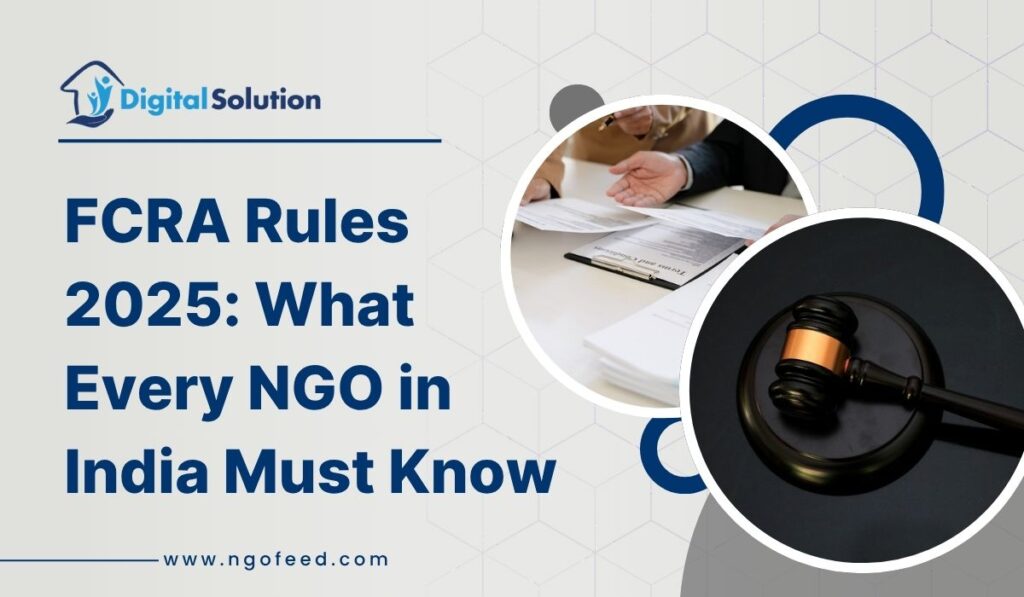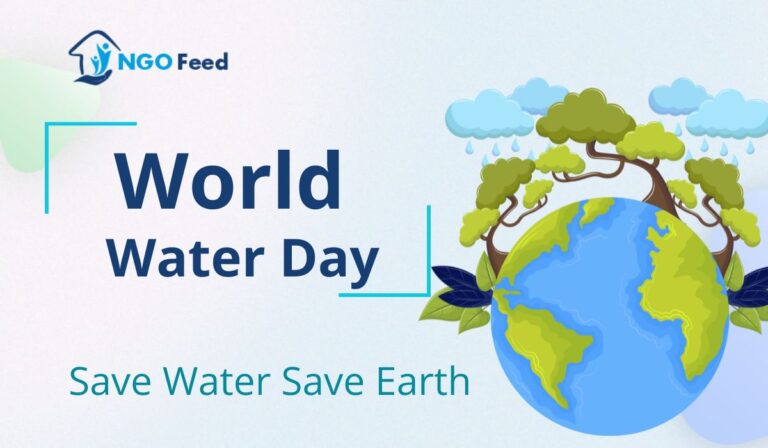FCRA Rules 2025: In 2025, non-governmental organisations (NGOs) in India that accept foreign funding continue to be central to following the regulations set by the Foreign Contribution (Regulation) Act (FCRA). Because the government wanted to protect national interests from foreign donations, FCRA was updated significantly lately to include greater transparency, accountability and security. Any NGO must be aware of the latest changes in the FCRA Rules, which took effect in 2025, as it affects their ability to follow the law and sustain both their operations and confidence from donors.
FCRA Rules 2025 are based on previous rules, which made reporting more thorough, adjusted the requirements for organisations to register and increased the focus on checking what foreign funding is being done. They have to regularly report their finances, go through more inspections and follow new codes of operation, especially with their board members and how to use them. The consequences for not complying with FCRA laws have become harsher, with the ability to suspend or revoke FCRA licenses immediately.
It is especially important for NGOs from various sectors, like health, education, environment or human rights, to be aware of how these rules will shape things. In case of a compliance failure, operations might stop, payments could be delayed, and the company’s image could suffer. At the same time, the changing requirements in the FCRA allow NGOs to make their own operations better and go along with the latest governance standards.
Also Read: CSR Strategy for NGO
The article offers a detailed look at what is new in the FCRA Rules 2025, how these changes influence NGO operations and the best ways to comply. This book helps guide you, no matter whether your NGO is just starting out or has worked overseas for years, through the complicated world of regulatory rules.
Table of Contents
Key Amendments in FCRA Rules 2025
Under the FCRA Rules 2025, new provisions are introduced to add transparency and increase supervision over the foreign aid given to NGOs in India. The changes in the regulations are meant to guarantee that money coming from other countries is properly used and supports the goals of the country.
A major update is mandating real-time disclosures of all contributions made by foreign citizens. NGOs are required to input the amount, the name of the donor and the reason for the donation on the government portal within 7 days after receiving money.
Also Read: How to Design a Crowdfunding Page for Nonprofits
Using foreign resources is another major issue examined by the amendment. Based on new rules, at least 80% of foreign contributions given to NGOs must be spent on the reported purpose within the year—this makes sure projects are carried out as planned.
Also, information about board members’ personal interests and compliance history is important during both registration and renewal. Office-bearers are now required by law to confirm that there is no evidence of misusing funds against them by the government.
There are also stricter rules for admin expenses, keeping the 20% limit but now requiring that exceptions be justified and obtained through early approval.
Now, the period for each cycle is down to 3 years (from 5) and interim checks by auditors play a part in deciding on renewal. They demand that NGOs go above just complying and also actively participate in good governance and transparency.
Also Read: How to Write a Mission Trip Fundraising Letter for a Nonprofit
Eligibility and Registration Criteria for NGOs
The eligibility and registration policies have grown stricter, requiring NGOs hoping to get foreign contributions to be very accountable, transparent and follow the law.
An NGO can only register under FCRA if it is registered under the Societies Registration Act, the Indian Trusts Act or as a Section 8 company under the Companies Act. The group should be at least three years old and should have done genuine social activity during that time. All three years’ activity reports and complete financial statements must be submitted.
In addition, NGOs are expected to have no legal or financial problems in their background. People holding office or sitting on the board must verify that they haven’t been convicted or investigated for misusing funds and that they aren’t linked to any organisations labelled as banned.
Also Read: How Wealth Screening For Nonprofit Empowers Fundraising
In 2025, the “Due Diligence Disclosure” was introduced—Now, NGOs must supply detailed information about who is leading them, where their funding comes from and how they spent funds in other countries, which the government will check.
If the donor requests prior approval (when they complete less than three years), the organisation must show a written guarantee from the donor and describe the intended project in detail.
Tougher rules keep trustworthy and properly governed NGOs from receiving foreign money, raising public confidence and making sure all laws are followed.
Financial Reporting, Auditing, and Disclosure Norms
Through the FCRA Rules 2025, there are now tougher financial reporting, auditing and disclosure obligations for NGOs in India. The new rules intend to make things clearer, eliminate the risk of misusing money from others and confirm that donations from other countries are put to their intended use.
A main requirement is to make financial information available in real time. When an NGO gets foreign contributions, it has to share the details of the donors, the amounts, the purposes and how the funds were transmitted on the FCRA portal within 7 days. The step is designed to make information available instantly.
Also Read: The Role of PayPal Giving Fund in Boosting Nonprofit Fundraising
In addition, NGOs should have a special bank account just for receiving and spending FCRA funds, and every transaction related to them must be carefully documented. Auditors will need to see the bank reconciliation and use statements on a monthly basis.
Under the updates, it is required that annual audited financial statements will be shared on both the official website of the NGO and on the FCRA portal. The person conducting the audit has to be a Chartered Accountant, and the report must make it clear what is from foreign sources and what is from domestic ones.
A significant change in 2025 will be a stronger review of administrative costs, and their cap will still be limited to 20% of foreign donations. Any change must be cleared in advance by the Ministry of Home Affairs.
Together, these rules prompt NGOs to manage money wisely and strengthen confidence in the donors.
Implications of Non-Compliance and Penalties
Stricter consequences are put in place for NGOs in the FCRA Rules 2025 to make sure the government emphasises transparency and accountability with foreign funding.
Also Read: Nonprofit Project Management
Breaking the rules can cause a variety of administrative and legal consequences. The immediate effect is losing their FCRA registration, so they cannot receive or use foreign funds. Without prior notice, a user may get suspended if there is reasonable evidence that their use or sharing is in violation of the rules.
Groups that fail to file annual tax returns, go above the 20% limit on managing costs without agreement or delay reporting foreign contributions by more than 7 days may get monetary penalties. How severe the offence is determines the fine, which may be thousands or lakhs of rupees.
If organisations mishandle money, submit false details or wrongfully use funds for unauthorised activities, their management may be prosecuted through criminal charges. Law enforcement can use the FCRA and other related laws to deal with these cases.
Making the same offenses again could see the organization blacklisted which could hurt its relationship with other parties and make future registration difficult.
For this reason, NGOs should build strong standards for complying internally and watch for any changes in FCRA.
Also Read: Donor Retention Strategies for NGOs
Best Practices for FCRA-Compliant Operations
In order to meet the ongoing changes in FCRA rules set up in 2025, NGOs need to strengthen their systems and practices and maintain the trust of the public and donors. These best practices act as a solid structure for improving product development.
Make sure to set up a special team or designate a compliance officer to handle all matters connected to the FCRA such as reports, documentation and audits.
Create a separate bank account for international donations and keep all records precise. Ensuring that finances are always clear and up to date is very important.
Also Read: Donor Retention Strategies for NGOs
Updating the FCRA portal happens, where NGOs report received foreign funds in a timely manner within 7 days and yearly statements by the deadline. Posting audited financials on the company’s website shows the public a sign of trust.
Administrative Expense Control: Make certain the organization does not go over its allowed 20% of administrative costs. Record every expenditure carefully and ask the Ministry of Home Affairs for approval if an exception applies.
Auditing internal operations and team building are important: Do an internal audit every quarter to discover and repair problems in a timely fashion. Regularly educate the management and employees on the rules of the FCRA, financial ethics and the proper way to document things.
Also Read: How to Write the Perfect Fundraising Email
When NGOs apply these best practices, their work is safe, follows the rules and is intended to have positive results supported by foreign funding.










I.Accptaed.
Thanks very much for the update. Very useful and timely warning for us to follow the compliances.